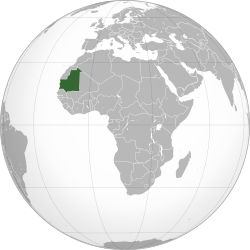Mauritania
Islamic Republic of Mauritania | |
|---|---|
| Motto: شرف، إخاء، عدل "Honour, Fraternity, Justice" | |
| Anthem: النشيد الوطني الموريتاني "Land of the Proud, Guided by Noblemen" | |
 Location of Mauritania (dark green) in western Africa | |
| Capital and largest city | Nouakchott 18°09′N 15°58′W / 18.150°N 15.967°W |
| Official languages | Arabic |
| Recognised national languages | French |
| Recognised regional languages | Pulaar, Soninke, Wolof, Zenaga |
| Other languages | English, Italian, Spanish |
| Ethnic groups | |
| Religion | Islam (Sunni) |
| Demonym(s) | Mauritanian |
| Government | Unitary semi-presidential Islamic republic |
| Mohamed Ould Ghazouani | |
| Mokhtar Ould Djay | |
| Mohamed Ould Meguett[1] | |
| Legislature | National Assembly |
| Independence | |
• Republic established | 28 November 1958 |
• Independence from France | 28 November 1960 |
• Current constitution | 12 July 1991 |
| Area | |
• Total | 1,030,000 km2 (400,000 sq mi)[2] (28th) |
• Water (%) | 0.03 |
| Population | |
• 2021 estimate | 4,614,974[3][4] |
• 2013 census | 3,537,368[2] |
• Density | 3.4/km2 (8.8/sq mi) |
| GDP (PPP) | 2018 estimate |
• Total | $18.117 billion[5] (134th) |
• Per capita | $4,563[5] (140th) |
| GDP (nominal) | 2018 estimate |
• Total | $5.200 billion[5] (154th) |
• Per capita | $1,309[5] (149th) |
| Gini (2014) | medium |
| HDI (2019) | low · 157th |
| Currency | Ouguiya (MRU) |
| Time zone | UTC (GMT) |
| Driving side | right |
| Calling code | +222 |
| ISO 3166 code | MR |
| Internet TLD | .mr |
Mauritania is a country in northwest Africa. The capital city, which is also the biggest city in the country, is Nouakchott. It is on the Atlantic coast. Its president is General Mohamed Ould Ghazouani.
At 1,030,700 km² (397,929 mi²),[8] Mauritania is the world's 29th-largest country (after Bolivia). It is similar in size to Egypt. The land is flat in most places.
Demographics
[change | change source]Religion
[change | change source]Mauritania is almost 100% Muslim, most of whom are Sunni. People can be killed in Mauritania for being an atheist.[9] On 27 April 2018, The National Assembly passed a law that allows for the death penalty for certain apostasy-related crimes.[10]
Language
[change | change source]Afro-Asiatic languages
[change | change source]Modern Standard Arabic is the official language of Mauritania. Hassaniya is the Arabic dialect that is widely spoken throughout the country. It is mostly used in daily life.
Berber languages
[change | change source]There are also some Berber languages that are spoken in Mauritania. In de south Zenaga is spoken and close to the border with Mali in the southeast Tamasheq (a variety of Tuareg) is spoken. Zenaga is only spoken by a few hundred people and seems to be close to disappearance.[11]
Foreign languages
[change | change source]As Mauritania is a former colony of France, it is now part of the Francophonie. French is spoken including African French and Maghreb French.
Niger-Congo languages
[change | change source]There are several Niger-Congo languages that are spoken in Mauritania. These are Wolof, Soninke, Pulaar and Bambara.[12]
Economy
[change | change source]
Mauritania is rich in natural resources but has a low GDP.[13] Many people living in Mauritania depend on farming and livestock. Mauritania has a large deposit of iron ore, which is almost half of the country's total exports.
References
[change | change source]- ↑ "Ould Baya élu président du parlement mauritanien". BBC News Afrique. 9 October 2018. Archived from the original on 14 April 2019. Retrieved 4 May 2019.
- ↑ 2.0 2.1 "1: Répartition spatiale de la population" (PDF). Recensement Général de la Population et de l'Habitat (RGPH) 2013 (Report) (in French). National Statistical Office of Mauritania. July 2015. p. v. Retrieved 20 December 2015.[permanent dead link]
- ↑ "World Population Prospects 2022". population.un.org. United Nations Department of Economic and Social Affairs, Population Division. Retrieved July 17, 2022.
- ↑ "World Population Prospects 2022: Demographic indicators by region, subregion and country, annually for 1950-2100" (XSLX). population.un.org ("Total Population, as of 1 July (thousands)"). United Nations Department of Economic and Social Affairs, Population Division. Retrieved July 17, 2022.
- ↑ 5.0 5.1 5.2 5.3 "Mauritania". International Monetary Fund. Archived from the original on 22 May 2020. Retrieved 7 June 2020.
- ↑ "Gini Index coefficient". CIA World Factbook. Retrieved 16 July 2021.
- ↑ Human Development Report 2020 The Next Frontier: Human Development and the Anthropocene (PDF). United Nations Development Programme. 15 December 2020. pp. 343–346. ISBN 978-92-1-126442-5. Retrieved 16 December 2020.
- ↑ "The World Factbook — Central Intelligence Agency". www.cia.gov. Archived from the original on 2014-02-09. Retrieved 2009-06-07.
- ↑ Evans, Robert (9 December 2012). "Atheists around world suffer persecution, discrimination: report". Reuters. Archived from the original on 2 October 2015. Retrieved 7 January 2015.
- ↑ Mehta, Hemant (17 May 2018). "Mauritania Passes Law Mandating Death Penalty for "Blasphemy"". Patheos. Archived from the original on 17 May 2018. Retrieved 17 May 2018.
- ↑ "L'arabisation en marche de la Mauritanie: quand une politique d'aménagement linguistique tenace est en passe de réussir (?)". www.unice.fr. Retrieved 2022-04-13.
- ↑ "What Languages Are Spoken in Mauritania?". WorldAtlas. 2017-08-01. Retrieved 2022-04-13.
- ↑ International Monetary Fund. Middle East and Central Asia Dept. (2015). Islamic Republic of Mauritania: Selected Issues Paper. International Monetary Fund. pp. 19–22. ISBN 978-1-4843-3657-1. Archived from the original on 22 May 2020. Retrieved 7 June 2020.
Other websites
[change | change source] Media related to Mauritania at Wikimedia Commons
Media related to Mauritania at Wikimedia Commons



